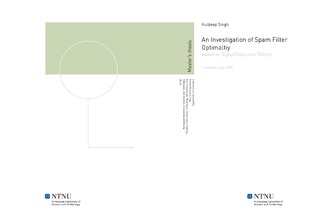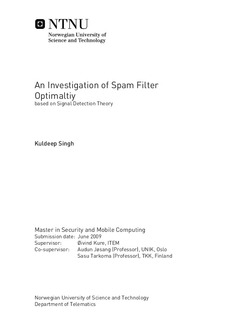| dc.contributor.advisor | Kure, Øivind | nb_NO |
| dc.contributor.advisor | Jøsang (Professor), Audun | nb_NO |
| dc.contributor.advisor | Tarkoma (Professor), Sasu | nb_NO |
| dc.contributor.author | Singh, Kuldeep | nb_NO |
| dc.date.accessioned | 2014-12-19T14:13:00Z | |
| dc.date.available | 2014-12-19T14:13:00Z | |
| dc.date.created | 2010-09-04 | nb_NO |
| dc.date.issued | 2009 | nb_NO |
| dc.identifier | 348887 | nb_NO |
| dc.identifier | ntnudaim:4586 | nb_NO |
| dc.identifier.uri | http://hdl.handle.net/11250/262006 | |
| dc.description.abstract | Unsolicited bulk email, commonly known as spam, represents a significant problem on the Internet. The seriousness of the situation is reflected by the fact that approximately 97% of the total e-mail traffic currently (2009) is spam. To fight this problem, various anti-spam methods have been proposed and are implemented to filter out spam before it gets delivered to recipients, but none of these methods are entirely satisfactory. This thesis analyzes the properties of spam filters from the viewpoint of Signal Detection Theory (SDT). The Bayesian approach of Signal Detection Theory provides a basis for determining the tuning of spam filters from the particular user's point of view and helps in determining the utility which the spam filter provides to the user. | nb_NO |
| dc.language | eng | nb_NO |
| dc.publisher | Institutt for telematikk | nb_NO |
| dc.subject | ntnudaim | no_NO |
| dc.subject | MSSECMOB Master in Security and Mobile Computing | no_NO |
| dc.subject | Information security | no_NO |
| dc.title | An Investigation of Spam Filter Optimaltiy: based on Signal Detection Theory | nb_NO |
| dc.type | Master thesis | nb_NO |
| dc.source.pagenumber | 69 | nb_NO |
| dc.contributor.department | Norges teknisk-naturvitenskapelige universitet, Fakultet for informasjonsteknologi, matematikk og elektroteknikk, Institutt for telematikk | nb_NO |

